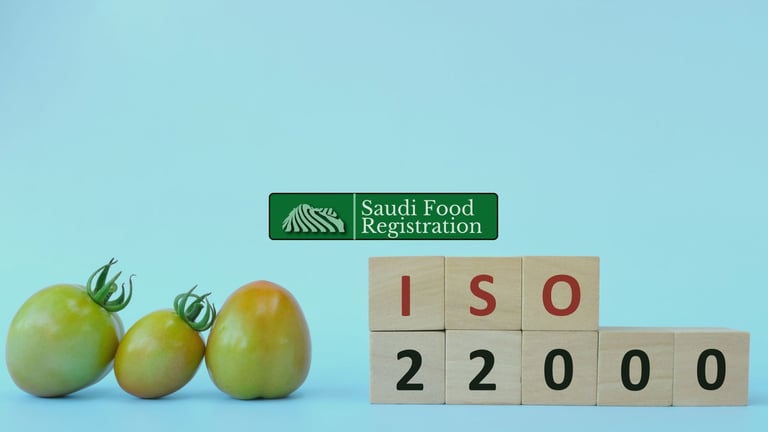ISO 22000 Certification in KSA
Get ISO 22000 certified in Saudi Arabia to meet SFDA regulations, enhance food safety, and expand market access with expert guidance | Saudi Food Registration
2/4/20253 min read


ISO 22000 Certification in Saudi Arabia
In today's global food market, ensuring food safety isn't just a regulatory requirement—it's a business imperative.
For food businesses operating in Saudi Arabia, understanding ISO 22000 certification is crucial for success in both local and international markets.
What is ISO 22000 Certification?
ISO 22000 certification represents more than just a certificate on your wall—it's your commitment to food safety excellence.
This internationally recognized food safety management system (FSMS) serves as your roadmap to maintaining the highest standards of food safety throughout your entire operation.
From farm to fork, ISO 22000 encompasses every step of the food supply chain, ensuring that your products meet not only international standards but also the specific requirements set by Saudi authorities like:
SFDA (Saudi Food and Drug Authority) and SASO (Saudi Standards, Metrology and Quality Organization).
Key Components of ISO 22000
Hazard Analysis and Critical Control Points (HACCP) – Identifies and controls food safety risks.
Good Manufacturing Practices (GMP) – Ensures food production meets hygiene and quality standards.
Risk-Based Thinking – Helps businesses proactively address potential food safety threats.
Traceability & Recall Systems – Strengthens response mechanisms for food safety incidents.
Why is ISO 22000 Important for Food Businesses in Saudi Arabia?
In the dynamic Saudi Arabian food market, ISO 22000 certification isn't just about compliance—it's about building trust and opening doors to new opportunities.
When you implement ISO 22000, you're not only meeting the stringent regulatory requirements enforced by SFDA and SASO, but you're also positioning your business for international trade success.
Key Benefits of ISO 22000 in Saudi Arabia
Regulatory Compliance – Ensures adherence to SFDA & SASO standards.
Market Expansion – Facilitates entry into global and regional food markets.
Food Safety Risk Reduction – Strengthens your ability to identify and mitigate food safety hazards.
Consumer Trust & Brand Reputation – Enhances credibility among health-conscious consumers.
Who Needs ISO 22000 Certification?
The scope of ISO 22000 certification extends across the entire food industry spectrum. Businesses that should pursue certification include:
Food manufacturers & processors – Packaged food, dairy products, beverages.
Catering & food service providers – Hotels, restaurants, hospitals.
Food logistics & storage facilities – Warehouses handling perishable goods.
Ingredient suppliers & agricultural producers – Farms, fisheries, and food ingredient manufacturers.
How to Obtain ISO 22000 Certification in Saudi Arabia
Achieving ISO 22000 certification requires careful planning and compliance with SFDA & SASO regulations. Here’s the step-by-step process:
1. Conduct a Gap Analysis
Assess current food safety processes against ISO 22000 standards.
Identify weaknesses and areas for improvement.
2. Develop & Implement FSMS Policies
Establish food safety objectives and procedures.
Train staff on best practices and regulatory compliance.
3. Perform Internal Audits & Corrective Actions
Conduct internal audits to ensure all processes meet ISO 22000 requirements.
Address any gaps and implement corrective measures.
4. Third-Party Certification Audit
Undergo an external audit by an ISO-accredited certification body.
Receive official ISO 22000 certification upon successful compliance.
5. SFDA Registration (If Required)
Ensure local regulatory compliance alongside ISO certification.
Some businesses may need additional approvals depending on food category.
How Long Does It Take & What Are the Costs?
Timeline
Standard certification process: 3 to 6 months.
Complex operations with high-risk food categories: Up to 12 months.
Cost Factors
Certification body fees – Varies depending on audit complexity.
Implementation costs – Developing food safety programs, employee training.
Ongoing maintenance – Regular audits and compliance updates.
How Saudi Food Registration Can Help
Achieving ISO 22000 certification can be a complex process, but our regulatory experts simplify compliance with tailored solutions:
✅ Gap analysis & pre-certification assessment to ensure a smooth approval process.
✅ Assistance in implementing FSMS policies to meet ISO 22000 standards.
✅ Guidance on SFDA alignment to prevent regulatory conflicts.
✅ Third-party audit preparation to ensure certification success.
Contact us or use our chatbot for help in obtaining ISO 22000 Certificate.
Related Reads:
GMP Certification for Food Businesses in Saudi Arabia – Understanding Good Manufacturing Practices compliance.
Navigating SFDA Food Safety Regulations – Key regulatory requirements for food businesses.
Avoiding Compliance Mistakes in 2025 – How to prevent costly food registration errors.
Discover how HACCP certification helps businesses meet SFDA food safety regulations and market standards.
Final Thoughts
ISO 22000 certification is more than just a compliance requirement—it’s a strategic investment in food safety, brand reputation, and market growth.
By achieving certification, businesses in Saudi Arabia can enhance food safety management, meet SFDA regulations, and gain a competitive edge in the global market.
Are you ready to take your food business to the next level?
Let Saudi Food Registration help you achieve ISO 22000 certification with expert guidance and a seamless approval process.
